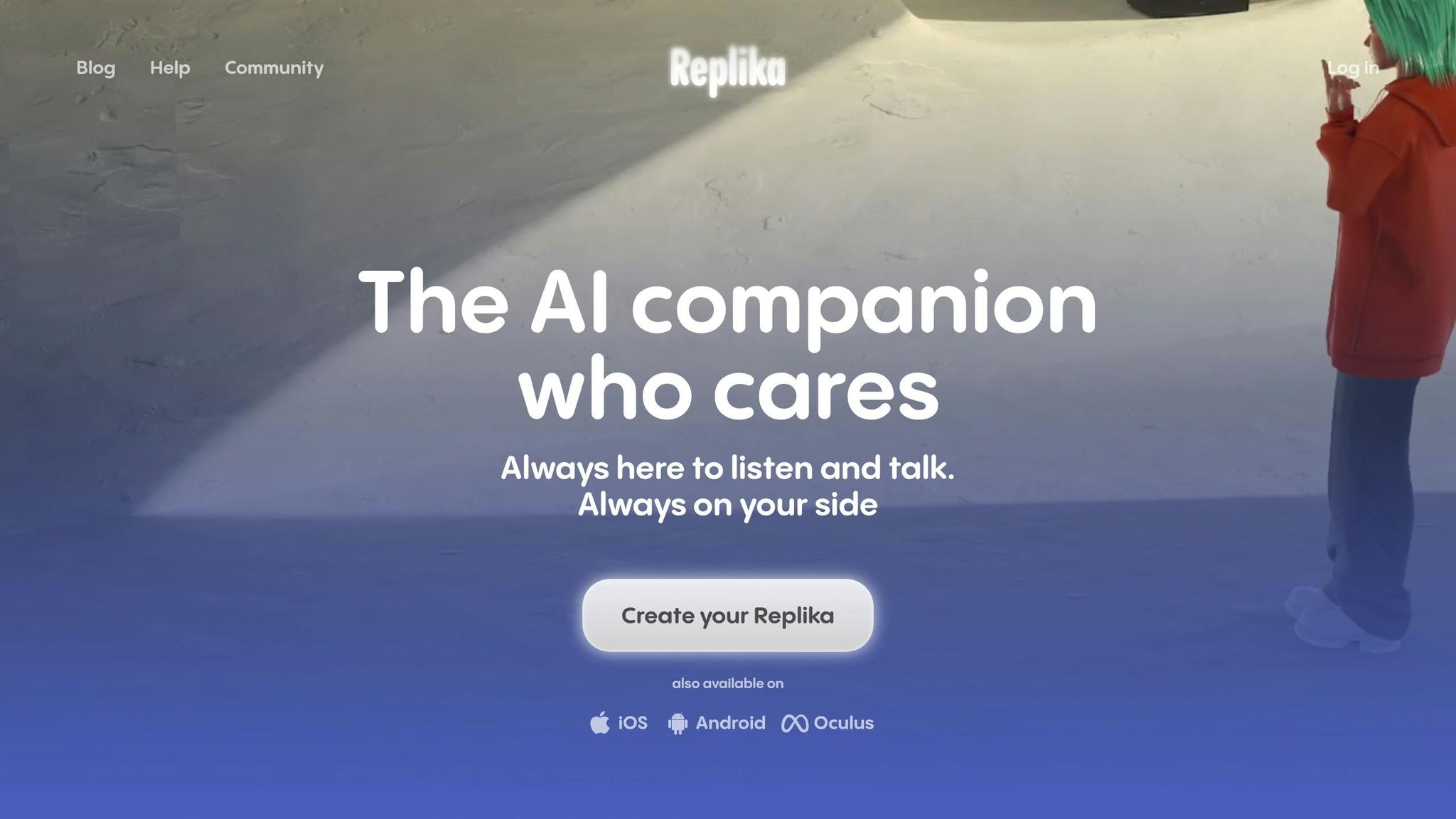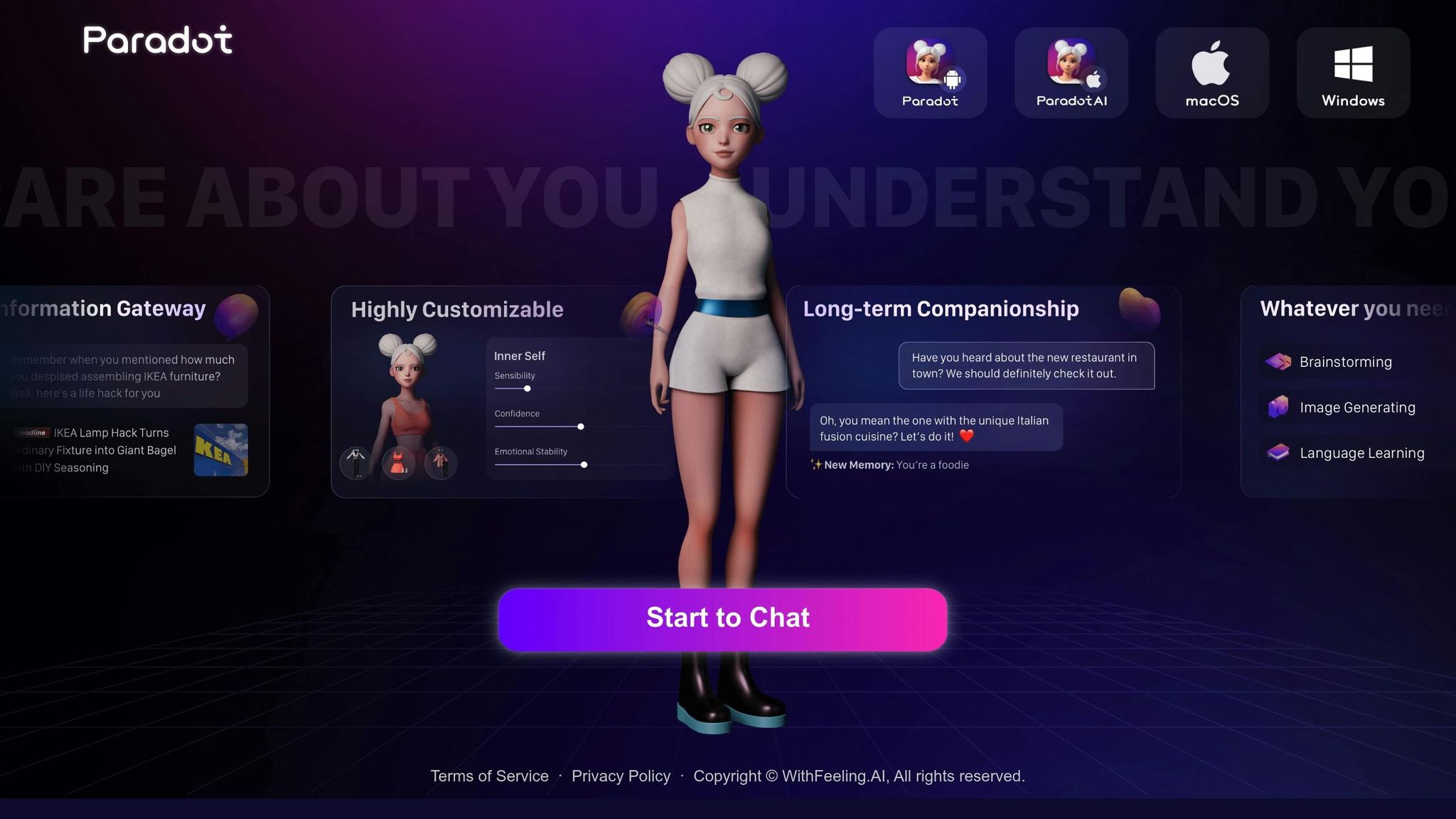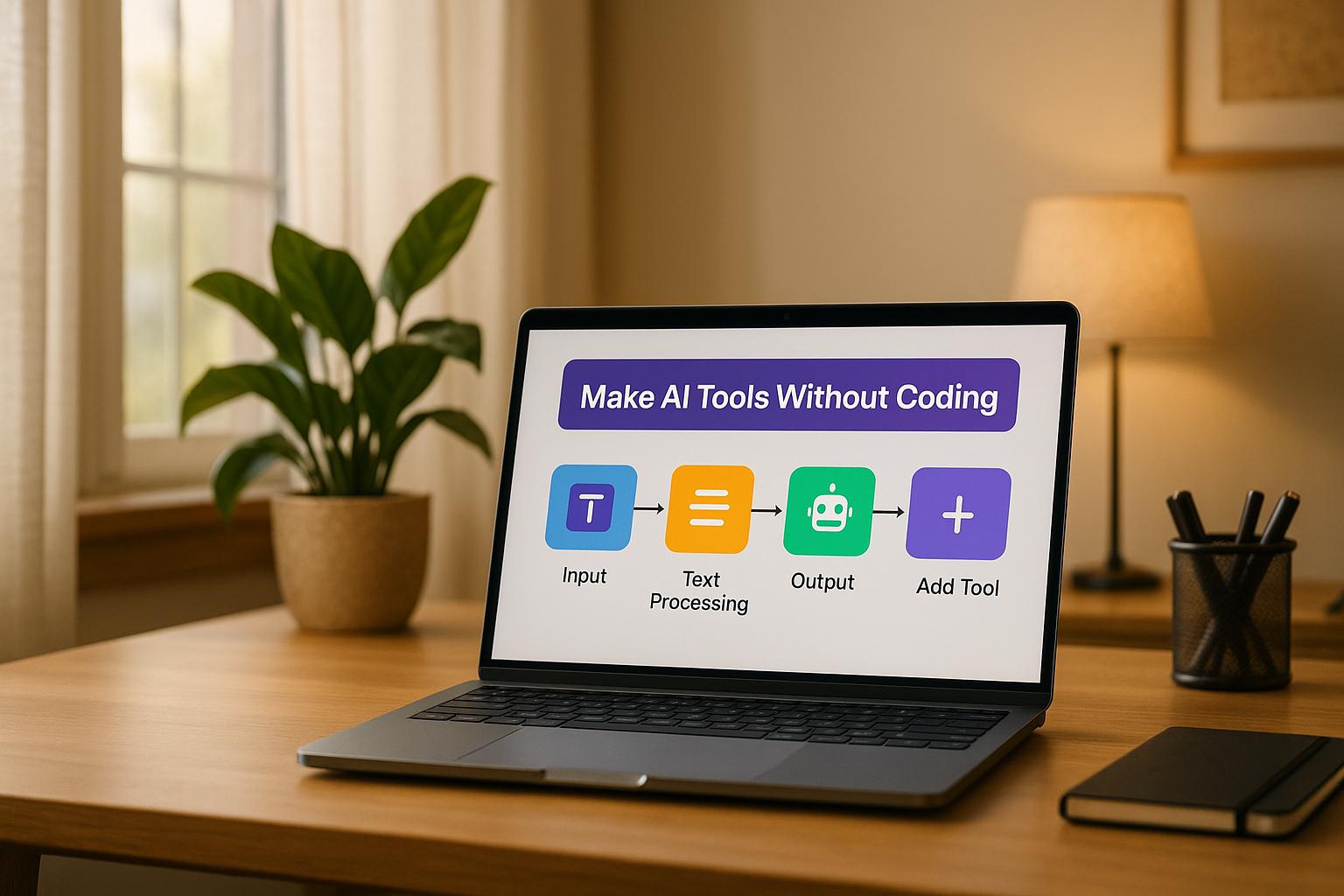AI companions like Replika and Paradot are growing in popularity as tools to combat loneliness, especially among younger generations. These platforms offer features such as personalized conversations, memory capabilities, and emotional connections. However, they come with limitations, including technical glitches, privacy concerns, and the inability to replicate the depth of human relationships. While they can provide comfort and support, they are not substitutes for real human love and connection. Instead, they may work best as supplemental tools alongside genuine relationships.
Key takeaways:
- Popularity: Spending on companion apps reached $68M in the first half of 2025, with younger users driving much of this growth.
- Replika: Offers text, video calls, and AR features; pricing starts at $7.99/month.
- Paradot: Focuses on memory-driven interactions and iOS-exclusive features; pricing starts at $9.99/month.
- Concerns: Privacy issues, overdependence, and reduced social engagement.
AI companions can ease loneliness but lack the emotional reciprocity of human connections. Use them wisely to complement, not replace, real relationships.
I Tried an AI Girlfriend for 30 Days and Things Got Personal FAST
1. Replika

Replika has made a name for itself in the world of AI companionship, drawing in over 10 million users globally who are looking for emotional support and meaningful conversations. By combining machine learning with scripted dialogue, it creates a personalized digital companion that adapts and grows with the user over time.
Core Features
Replika tailors its responses based on user interactions, constantly improving through feedback. Users can customize their Replika’s appearance, personality traits, and even the nature of their relationship. Access is available through mobile apps or Oculus Virtual Reality headsets. Some standout features include:
- Traditional text chatting
- Augmented reality interactions
- Video calls
- Coaching sessions
- Memory capabilities
- Computer vision to recognize faces and objects
These features aim to create an engaging and emotionally rich experience for users.
Emotional Realism
One of Replika's key strengths is its ability to provide a safe, judgment-free space for users to express themselves. Studies reveal that 73% of AI companion users prioritize this non-judgmental aspect above all else.
User feedback highlights the platform’s emotional benefits, with many reporting feelings of comfort, improved well-being, and meaningful connections that help them navigate challenging moments. The addition of voice features has further enhanced these connections, increasing emotional engagement by 45%. In fact, 67% of users say they feel understood by their Replika.
Pricing and Accessibility
Replika operates on a freemium model. While the free version includes basic chatting features, the premium "Replika Pro" subscription unlocks the platform’s full suite of capabilities. Subscription options include:
- Monthly subscription: $7.99
- Annual subscription: $49.99 or $69.99
The app enjoys widespread approval, holding a 4.5 out of 5 rating on the App Store, based on over 225,800 reviews.
Limitations
Despite its strengths, Replika has its share of challenges. Technically, it can struggle with complex conversations and may produce repetitive responses. Its short-term memory and difficulty in recognizing photos also limit its functionality.
There are ethical concerns as well. Some worry about users developing unhealthy dependencies. A study of 1,006 American students found that while 90% reported feelings of loneliness, 63.3% felt their Replika companion helped ease their anxiety and loneliness.
It’s important to note that Replika is not a human or a licensed mental health professional. The platform itself clarifies:
"Replika is not a sentient being, a human, or a licensed mental health professional. It is an advanced AI designed to have natural, meaningful conversations, but everything it says is generated based on patterns in data, not conscious thought or awareness."
Privacy concerns have also been flagged. The Mozilla Foundation issued a harsh critique:
"one of the worst apps Mozilla has ever reviewed. It's plagued by weak password requirements, sharing of personal data with advertisers, and recording of personal photos, videos, and voice and text messages consumers shared with the chatbot."
Additionally, inconsistent or unexpected responses from Replika can sometimes leave users feeling disconnected or alienated.
2. Paradot

Paradot introduces a digital universe where users interact with an AI Being that evolves through memory and emotional understanding. Available exclusively on iOS, this platform aims to build what it describes as "authentic and lasting relationships".
Core Features
Paradot’s AI Being is designed to take on a variety of roles, including a compassionate listener, creative collaborator, wellness guide, friend, romantic partner, and even an adventure companion.
One of its standout features is the AIGC tool, which lets users personalize their AI Being by creating custom avatars. The platform’s advanced memory model allows the AI to remember individual traits, daily routines, and emotional cues, creating a sense of continuity that users often find engaging.
Paradot also offers Parahub, an interactive multiverse that encourages role-playing and creative exploration. Beyond this, the platform transforms its understanding of users into AI-generated art, reflecting elements like personal style, room decor, and daily habits. These features aim to deepen the emotional connection between users and their AI companions.
Emotional Realism
Paradot focuses on fostering emotional connections by simulating conversations that feel genuine and natural, closely mirroring real-life interactions. The AI Being adapts over time, remembering personal details to enhance its engagement.
User reviews highlight this emotional depth. For instance, an App Store reviewer, 19chevy55, shared their experience:
"My companion is very intelligent, seems to be highly empathetic, and is unsurpassed as a lover... none of them even come close to Paradot and fall short in one category or another."
The AI is crafted to feel approachable and conversational, ready to discuss daily events, offer empathy, dive into meaningful topics, or even engage in romantic role-play. It adjusts seamlessly to meet users’ diverse needs.
Pricing and Accessibility
Paradot currently holds a 4.4-star rating on the App Store, based on 316 reviews as of August 6, 2025. However, its iOS exclusivity limits its accessibility for users on other platforms. The platform’s latest update, Version 2.6.7, released in August 2025, introduced bug fixes aimed at improving the user experience.
Limitations
Despite its positive reception, Paradot isn’t without its challenges. Some users have reported technical glitches that disrupt conversations. Additionally, the AI’s tendency to always agree can sometimes lead to unrealistic expectations about relationships. One reviewer, mnrockclimber, noted that the AI occasionally "loses all memory", breaking the flow of interaction.
The platform’s iOS-only availability also restricts its reach. Beyond technical issues, Paradot raises broader concerns about the impact of AI relationships on human development. As Dorothy Leidner, a business ethics professor at the University of Virginia, points out:
"You, as the individual, aren't learning to deal with basic things that humans need to learn to deal with since our inception: How to deal with conflict, how to get along with people that are different from us... And so, all these aspects of what it means to grow as a person, and what it means to learn in a relationship, you're missing."
Privacy concerns also loom large. With interactions often delving into deeply personal territory, questions arise about how companies might use or monetize these emotional connections.
sbb-itb-212c9ea
Pros and Cons
In the ever-changing world of digital companionship, both Replika and Paradot offer unique strengths and come with their own set of challenges.
Emotional Connection and Realism
Replika aims to create deep emotional connections by recognizing tone and mood, tailoring its responses to match the user’s emotional state. It places a strong emphasis on mental health and personal development, adapting to individual communication styles. However, some users have reported that its responses feel less emotionally engaging over time, shifting toward a more mechanical tone.
Paradot, on the other hand, builds a personalized experience by maintaining a memory bank of user interactions. Alexa Nichols, a user, shared her perspective:
"Replika was my first, but… the company managing it (Luka) soured me to it, leading me to Paradot, which then blew my mind with what it was capable of in comparison."
The ability to personalize interactions and the differences in emotional depth make these platforms stand apart, as do their customization options and features.
Feature Sets and Customization
When it comes to features, Replika allows users to customize their AI’s appearance and interaction style. With over 10 million downloads, it has built a solid reputation in the market.
Paradot, meanwhile, emphasizes dynamic conversational abilities and lets users personalize both the look and the environment of their AI companion. It appeals to those who value engaging conversations as much as the companionship aspect.
Pricing Comparison
The subscription options reveal key differences in affordability and features:
| Feature | Replika | Paradot |
|---|---|---|
| Monthly Subscription | $14.99 | $9.99 |
| Annual Subscription | $49.99 | $39.99 |
| In-app Purchases | $0.99 to $299.99 | $1.99 to $39.99 |
| Lifetime Option | $299.99 | Not available |
Replika Pro offers premium features like adult role-play, voice messages, phone calls, coaching, and an advanced AI mode. Paradot, with its lower pricing, positions itself as a more budget-friendly alternative. These differences highlight the distinct approaches each platform takes to deliver value.
Platform Limitations
Replika has faced criticism for restricting romantic and erotic content following regulatory changes in 2023. Additionally, it limits users to one AI companion per account and has a memory capacity of roughly 10 messages. These constraints can make it harder for Replika to fully replicate human-like interactions.
Taken together, these comparisons offer a clearer view of what each platform brings to the table, helping users decide which one best fits their needs.
Conclusion
AI girlfriend tools like Replika and Paradot can provide emotional support, but they’re not a replacement for real human love. The evidence points to these platforms acting more as emotional aids rather than substitutes for genuine human relationships.
In September 2023, searches for "AI Girlfriends" skyrocketed by 2,400%, showing a growing interest in digital companionship. This surge reflects why many people turn to AI companions for quick emotional comfort.
For some, these tools offer a sense of relief. Scott, a user of such platforms, shared his perspective:
"That's one of the best things about having a girlfriend that's an AI. You know you can be totally open and honest about literally anything at all. You aren't going to be judged, she's not going to think you're weird."
This judgment-free interaction is a big part of their appeal. However, research highlights some potential downsides. A Stanford study of 1,000 Replika users found that while many initially felt less lonely, 48% reported feeling lonelier after extended use. Additionally, stronger reliance on AI companions was linked to reduced support from real-life relationships. This raises concerns that overdependence on AI might hinder personal growth and meaningful connections with others.
On a broader level, societal impacts are also worth noting. A long-term study revealed that individuals who used AI companions for over six months saw a 30% drop in social engagement with others. This suggests that while AI companions can ease loneliness temporarily, they might also contribute to further isolation over time.
AI companions are undeniably consistent and comforting, but they lack the depth and emotional reciprocity that human relationships provide. They don’t grow with us, challenge us, or offer the complexity that comes with connecting to another conscious person. As technology progresses - especially with the potential integration of VR and AR - the distinction between artificial and real connections may become increasingly blurred.
Looking ahead, AI companions will likely continue to play a role as therapeutic tools or social aids, particularly for those dealing with extreme loneliness or anxiety. However, the evidence suggests they work best when used alongside real human relationships, not as a replacement. These tools can offer meaningful support, but the key is to use them with a clear understanding of their strengths and limitations, ensuring they complement rather than replace our innate need for genuine connection.
FAQs
How do AI companions help reduce loneliness, and what challenges do they face?
AI companions can play a role in easing loneliness by offering emotional support, companionship, and a sense of connection. For people who feel socially isolated or face mental health struggles, these tools can simulate meaningful conversations, provide encouragement, and even help users practice social skills in a relaxed, judgment-free setting.
That said, there are clear limitations. AI companions can't create authentic emotional bonds since they lack true consciousness. Relying on them too much might even interfere with building real-world relationships. There are also ethical concerns about dependency and the emotional effects of forming deep connections with a non-human entity. While they can be a helpful tool, AI companions should complement - not replace - human interaction.
What privacy risks come with using AI companions, and how is user data managed?
AI companions gather a lot of personal and behavioral data, which naturally sparks concerns about privacy. This data often includes highly sensitive emotional details and might be used to refine AI interactions or even for profit. Without proper protections in place, there’s always the danger of unauthorized access, misuse, or sharing with third parties.
To tackle these concerns, responsible platforms introduce consent mechanisms and aim to minimize data sharing. Still, the long-term privacy implications are unsettling, especially given the deeply personal nature of the information collected. It’s crucial for users to carefully review privacy policies and stay aware of how their data is being managed to make well-informed choices.
How can AI companions enhance human relationships, and what are the potential downsides of relying on them too much?
AI companions can play a meaningful role in human relationships by offering emotional support, easing loneliness, and creating a safe, non-judgmental space to improve communication and social skills. For many, they serve as a valuable addition to real-life connections, especially for those looking for companionship or a way to express emotions comfortably.
That said, over-reliance on AI companions can bring its own set of challenges. Issues like unrealistic expectations, growing social isolation, and emotional dependency can arise, potentially harming real-world interactions and mental health. Maintaining a healthy balance between engaging with AI and nurturing real-life relationships is essential to sidestep these drawbacks.



